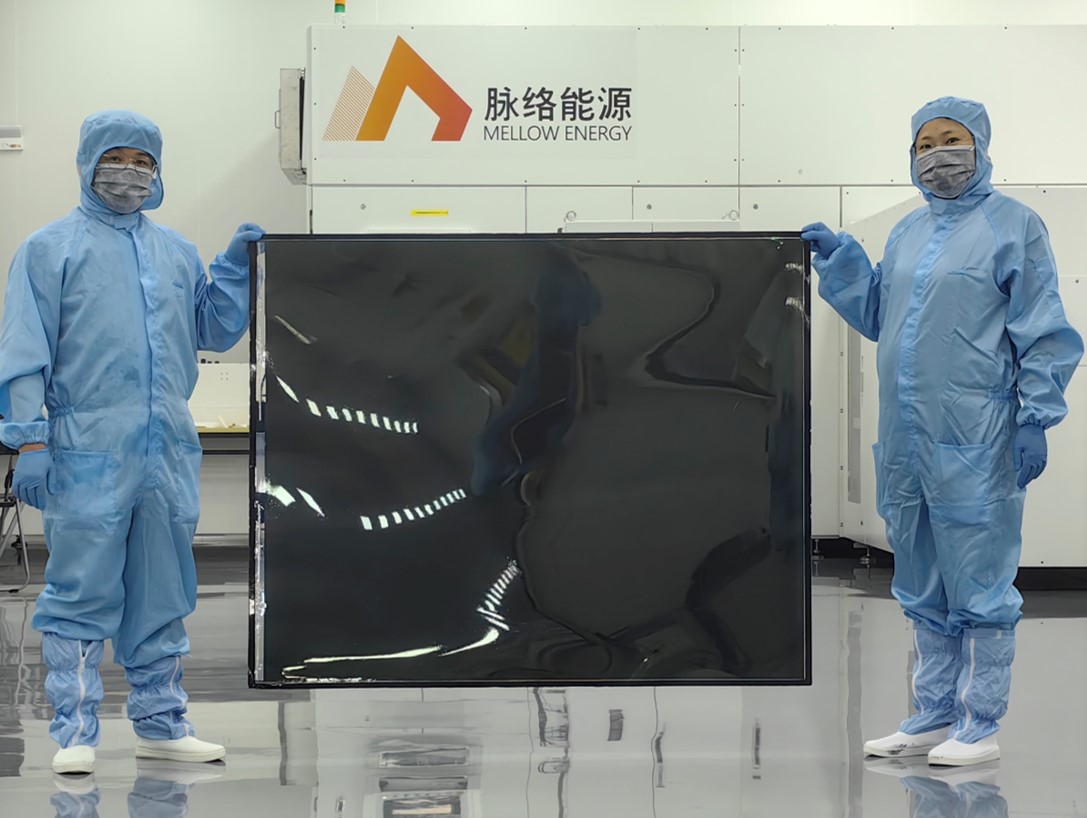China-based perovskite solar cell and module manufacturer Mellow Energy, a spin-off of the Institute of New Energy Technology at Jinan University, announced it has fabricated what it claims to be the world’s largest integrated flexible perovskite photovoltaic module.
“The ML-Flex module measures 1,200 mm x 1,600 mm x 1 mm and weighs only 2.04 kg,” the company’s CTO, Shaohang Wu, told pv magazine. “It demonstrates the scalability of perovskite solar cells, a technology that has been gaining attention for its high efficiency, lightweight properties, and low production costs.”
“What makes this achievement even more promising is the wide range of potential applications for flexible perovskite photovoltaics,” he went on to say. “From wearable devices and portable solar products to more advanced uses like electric vehicles (EV), drones (UAV), and even building-integrated photovoltaics (BIPV), the versatility of this technology opens up opportunities across multiple industries.”
The new product is available in five versions with power output ranging from 260 W to 300 W and power conversion efficiency of 13.5% to 15.1%. The open-circuit voltage spans from 200 V to 205 V and the short-circuit current from 2.16 A to 2.26 A, with the fill factor being between 60% and 65%.
The panels can operate within a temperature range of -40 C to 85 C and exhibit an operating temperature coefficient of -0.30%/C. They feature an IP68-rated junction box.
“Our production line has a designed capacity of 100 MW for rigid modules and is also compatible with flexible module production. The line is currently in the performance and capacity ramp-up stage,” Wu explained. “Our large-scale production line can reduce production costs, improve scalability, and further push perovskite technology toward widespread commercialization.”
“We have recently taken off the assembly line and currently undergoing third-party efficiency certification and certification results are pending” he further explained. “For flexible modules, stability testing has commenced following recent production, while for rigid panels we anticipate passing IEC 61215 certification by June this year.”
A research group led by Wu last year unveiled a monolithic perovskite solar module based on an interconnection technique that reportedly prevents the effusion of volatile components from the perovskite solar cell absorber.
“In monolithic perovskite solar modules, the migration of ions in the interconnect region is a critical factor that affects both efficiency and stability,” Wu told pv magazine at the time. “To address this issue, Jinan University and Mellow Energy have proposed an innovative method for in-situ generation of ion barrier layers, resulting in a substantial enhancement in efficiency and stability. This gas-phase treatment technique requires simple equipment, is user-friendly, and eliminates the need for additional coating processes, making it highly suitable for integration into production lines.”
The scientists fabricated the panel with an inverted perovskite cell based on an anti-diffusion layer, a substrate made of glass and indium tin oxide (ITO), a hole transport layer (HTL) made of poly-triarylamine (PTAA), a 3D-2D perovskite absorber hybridized with PoBx species, an electron transport layer (ETL) based on a buckminsterfullerene (C60) and tin(IV) oxide (SnO2), and a silver (Ag) metal. They interconnected the solar cells via P1, P2, and P3 scribes.
The ETL was deposited on the perovskite absorber via atomic layer deposition (ALD) to inhibit the vertical escape of volatile species. They then applied post-annealing to improve the redistribution and recrystallization of the perovskite composition. The 2D/3D heterostructure is aimed at accelerating the charge extraction at the perovskite/C60 interface and suppressing light-induced halide segregation.
This content is protected by copyright and may not be reused. If you want to cooperate with us and would like to reuse some of our content, please contact: editors@pv-magazine.com.









By submitting this form you agree to pv magazine using your data for the purposes of publishing your comment.
Your personal data will only be disclosed or otherwise transmitted to third parties for the purposes of spam filtering or if this is necessary for technical maintenance of the website. Any other transfer to third parties will not take place unless this is justified on the basis of applicable data protection regulations or if pv magazine is legally obliged to do so.
You may revoke this consent at any time with effect for the future, in which case your personal data will be deleted immediately. Otherwise, your data will be deleted if pv magazine has processed your request or the purpose of data storage is fulfilled.
Further information on data privacy can be found in our Data Protection Policy.